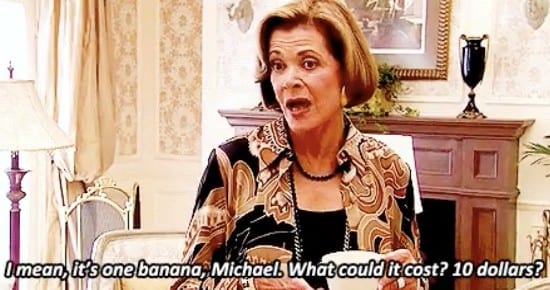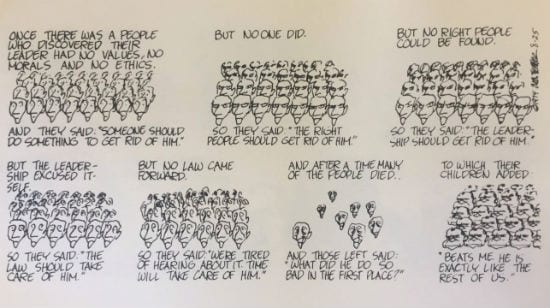A couple of years back I explored the stubborn American denial of climate change as, in part, a consequence of denying blame. In that post — “All are responsible” — I wrote:
It seems easiest to get us humans to respond — to take responsibility — when the matter at hand is unambiguously no fault of our own. Remove any potential hint of culpability and we’re more likely to agree to act. Frame the text-book hypothetical in such a way that it is clear no one is accusing us of having caused the drowning stranger’s predicament and we will eagerly reach, throw, row and go until he is safely back on dry land.
This is strange because the logic of justice would seem to work the other way around. A person partially to blame for the drowning stranger’s predicament would seem to have a greater obligation to assist him than would a person wholly uninvolved in his plight. And a person directly to blame for his situation would seem to have an even greater obligation.
Yet we seem to have an instinctual defensiveness that shouts down the logic of justice. It’s like a kind of moral fight-or-flight instinct that kicks in whenever we feel cornered into accepting some measure of blame.
And this is an understandable response to climate change, since it is a long-developing unintended, unforeseen (or, at least, it used to be unforeseen) consequence of otherwise benign activity:
This kind of accidentally disastrous consequences arising from well-intentioned actions is particularly confusing for the many Americans, including most evangelical Christians, who have a primarily visceral sense of morality, where what matters is what’s “in your heart.” Good-hearted decisions to do what you think is best for your family — a nice suburban home, cars chosen for their tank-like safety, etc. — can’t conceivably, from this perspective, produce anything but good results. The absence of deliberate malice constitutes innocence.
And that innocence will angrily assert itself against any suggestion of blame — or any suggestion of responsibility that sounds like it might be somehow connected to blame.
My argument there still seems right to me, but I didn’t have evidence to support my conclusions. Happily, researchers have been busily researching.
At Grist, KC Golden writes about “Why our biggest moral challenge doesn’t act like one,” directing us to work by researchers Ezra Markowitz and Azim Shariff.
Golden notes that Markowitz and Shariff found some evidence that, as I speculated, a denial of climate change may arise in part from a refusal to accept blame, writing: “To allay negative recriminations, individuals often engage in biased cognitive processes to minimize perceptions of their own complicity.”
Golden critiques this a bit, amending it to include some consideration of efficacy. Markowitz and Shariff’s discussion of guilt, he writes:
Downplays the importance of efficacy in the development of moral responsibility. Bob Doppelt makes the case that motivating big changes in human behavior requires dissonance, efficacy, and benefits. Lack of efficacy often seems like the bottleneck when it comes to moral engagement on climate. The strategies within any actor’s scope of effectiveness are not scaled to the problem. No use accepting guilt, let alone responsibility, if you can’t do anything about it.
Markowitz summarizes more of his research in a post at Big Think, titled “Why Few Americans View Climate Change as a Moral Problem.”
Here’s a quick recap of what we write in the paper:
1) … climate change is a complex, distant (for now) and abstract phenomenon …
2) … the moral judgment system is finely tuned to recognize specific types of moral transgressions, such as intentionally performed actions that cause harm to identifiable victims … climate change lacks many of these features: its victims are by-and-large strangers or not yet alive and it is a side-effect of modern life, not something anyone is intentionally trying to cause …
3) … people tend to reject … messages of blame …
4) … uncertainty regarding the timing, severity, and location of future climate change impacts provides room for overly optimistic beliefs …
5) … the victims of climate change … are likely to be perceived as out-group members …
6) … the existing framing of climate change as a moral issue targets only a subset of people’s moral values …
That reinforces and reaffirms a great deal of what I wrote in that 2010 post, but let me quote one more caveat from that post:
I don’t mean to discount the effect of an extremely well-funded disinformation campaign or the collective effect of the army of liars-for-hire serving as its footsoldiers. Nor would I rule out the impact of knee-jerk, whatever-Obama-says-I-believe-the-opposite partisan insanity. But I think what I’m discussing here also contributes to the level of denialism.












